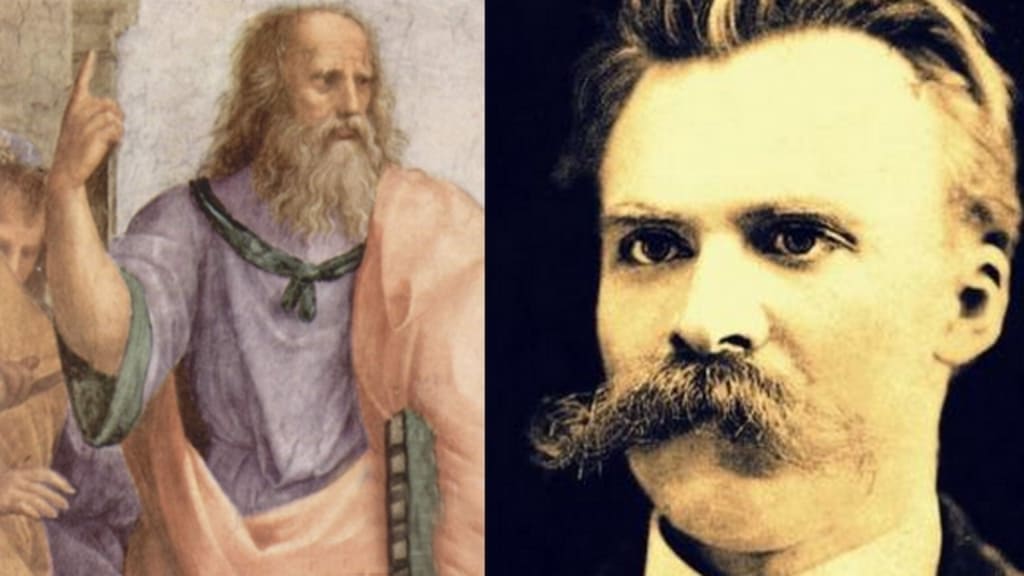Why did Nietzsche call Plato a nihilist who hates life?
Nietzsche's Critique of Plato

The philosophical exchange between Friedrich Nietzsche and Plato is one of the most intriguing debates in the history of philosophy. Nietzsche, the 19th century German philosopher, criticised Plato for his metaphysics, which he believed to be an expression of nihilism and a hatred of life. Nietzsche claimed that Plato's philosophy was life-denying and turned its back on the world of sensory experience. In this article, we will explore Nietzsche's critique of Plato's philosophy, examining his objections to Platonic metaphysics, the implications of the Platonic theory of forms for life, the Platonic dualism that Nietzsche rejected, and the role of art in both Nietzsche and Plato's views. We will conclude by examining the significance of Nietzsche's critique of Plato's philosophy for contemporary philosophy.
Introduction: Nietzsche's Critique of Plato
When it comes to ancient philosophers, Plato is often regarded as one of the most significant contributors to Western philosophy. However, Friedrich Nietzsche, a prominent 19th century philosopher, had a different view. He saw Plato's philosophy as a form of nihilism that rejected life. This article explores Nietzsche's critique of Plato's philosophy and how it shaped his own ideas about nihilism and life-affirmation.
Plato's Impact on Western Philosophy
Plato's philosophy is well-known for its emphasis on the realm of abstract concepts and ideas. His famous theory of Forms, posits that the physical world we see is merely a shadow of the true reality which exists in a world of perfect Forms. This idea, along with his emphasis on reason and the immortality of the soul, had a significant impact on Western philosophy. Many philosophers, including Descartes and Kant, were influenced by Plato's ideas.
Nietzsche's Critique of Plato's Philosophy
While Plato's philosophy has had a significant impact on Western thought, Nietzsche was not impressed. He criticized Plato's emphasis on reason as a way to access reality, arguing that it lead to a nihilistic rejection of the physical world. Nietzsche saw Plato's philosophy as denying the importance of life and the body. In Nietzsche's view, this kind of life-denying philosophy leads to nihilism, where people lose meaning and purpose in their lives.
Nihilism and Life-Appreciation in Nietzsche's Philosophy
Nietzsche's Concept of Nihilism
Nietzsche's concept of nihilism is central to his critique of Plato's philosophy. In Nietzsche's view, nihilism is the rejection of all values, beliefs, and meaning. He saw it as a pervasive problem in modern society, where people have lost a sense of purpose and direction in their lives. Nietzsche believed that nihilism was a dangerous force that could lead to despair and a lack of vitality.
Nietzsche's Critique of Life-denying Philosophies
Nietzsche saw Plato's philosophy as a form of life-denial, which he believed was a hallmark of nihilistic thinking. Nietzsche argued that life should be affirmed and celebrated as it is, rather than rejected in favor of some abstract idea of perfection. In his view, life-affirmation was essential to overcoming nihilism and finding meaning in one's existence.
Plato's Metaphysics and its Discontents
Plato's Theory of Forms
Plato's theory of Forms posits that physical objects are merely imperfect copies of the true Forms that exist in a higher realm of reality. Plato believed that the physical world was transient and unreliable, while the realm of Forms was eternal and unchanging.
Plato's Critique of Sensory Knowledge
Plato was critical of sensory knowledge, which he saw as unreliable and deceptive. He believed that true knowledge could only be accessed through reason and the contemplation of universal concepts, as opposed to empirical observation.
Plato's "World of Forms" and its Implications for Life
Plato's Distinction between Appearance and Reality
Plato saw a fundamental distinction between appearance and reality. He believed that the physical world we see is merely an imperfect reflection of the true reality that exists in the realm of Forms. Plato believed that true knowledge and understanding could only be achieved through reason and the contemplation of abstract concepts.
Plato's Ethics and its Consequences for Life
Plato's ethical philosophy was based on the idea of achieving a harmonious relationship between the rational and irrational parts of the soul. He believed that the ultimate goal of human existence was to achieve a state of inner balance and harmony. Nietzsche saw this as a form of life-denial, since it placed greater value on the idea of inner harmony than on the reality of life itself.
In conclusion, Nietzsche's critique of Plato's philosophy was shaped by his belief in the importance of life-affirmation and his rejection of nihilism. While Plato's philosophy had a significant impact on Western philosophy, Nietzsche saw it as a form of life-denial that rejected the importance of the physical world. Nietzsche's ideas about nihilism and life-affirmation continue to be relevant today, as people search for meaning and purpose in a world that sometimes seems devoid of both.
Nietzsche's Criticism of Platonic Dualism
Nietzsche's critique of Plato's philosophy rests largely on his rejection of dualism. Plato famously divides reality into the realm of the sensible and the realm of the intelligible. This dualism separates the physical world from the world of ideas or forms, which is considered to be the more real of the two. Nietzsche argued that this approach is nihilistic because it devalues the physical world in favor of an abstract ideal. For Nietzsche, a true philosophy of life must embrace both sides of reality.
Nietzsche's Rejection of Dualism
Nietzsche disagreed with the Platonic idea of the world of forms as a more perfect reality. He argued that there is no transcendent realm beyond the physical world, and that reality is always embedded in materiality. Instead of dividing reality into two opposing spheres, Nietzsche believed that the physical and ideal must be considered as inseparable.
Nietzsche's Critique of Idealism
Nietzsche also criticized the Platonic idealism that seeks to escape from the physical world. He saw this rejection of the world as a form of nihilism that denies the inherent value of life. Nietzsche believed that life should be embraced in all its complexity, which means accepting both its ugliness and beauty.
The Role of Art in Nietzsche and Plato's Views
The role of art is another point of divergence between Nietzsche and Plato's views.
Nietzsche's Aesthetic Philosophy
Nietzsche's aesthetic philosophy emphasized the transformative power of art. He believed that art has the ability to elevate the individual beyond their current state of existence and to create a new perspective on life. For Nietzsche, art is not only about beauty, but also about the human experience.
Plato's Aesthetics and its Relation to his Metaphysics
Plato, on the other hand, saw art as a tool for creating illusions that distract people from seeing the true nature of reality. He believed that art could only imitate reality and therefore was not truly creative. Instead of being a transformative force, Plato saw art as a passive and deceptive medium.
Conclusion: Nietzsche's Assessment of Plato's Legacy
Nietzsche's critique of Platonic dualism and idealism challenges the traditional view of Plato as a philosopher who elevated the spiritual over the physical.
Nietzsche's Critique in the Context of his Wider Project
Nietzsche saw his critique of Plato as part of his larger project to overcome traditional morality and values that he believed hindered individuals from experiencing the fullness of life. Nietzsche believed that by rejecting the ideals of Plato, individuals can create their own values and live more authentically.
The Significance of Nietzsche's Critique for Contemporary Philosophy
Nietzsche's critique of Plato's philosophy continues to be relevant in contemporary philosophy, particularly in discussions surrounding the nature of reality, the role of art, and the rejection of traditional values. Nietzsche's emphasis on the importance of embracing life and its complexities remains a powerful message for anyone seeking a more authentic existence.In conclusion, Nietzsche's criticism of Plato's philosophy was a product of his attempt to overcome nihilism and to re-evaluate the values of life. While Plato's metaphysics and philosophy continue to be studied and debated, Nietzsche's critique remains relevant for contemporary philosophy and its ongoing quest to understand the nature of reality and the meaning of life.
FAQ
What is nihilism?
Nihilism is a philosophical concept that denies the existence of objective meaning or value in life. It holds that life is ultimately meaningless, and that there is no inherent purpose or direction in the universe.
What is Plato's theory of forms?
Plato's theory of forms proposes that there is a realm of abstract, eternal forms or ideas that exist independently of the physical world. The physical world is seen as a mere shadow or copy of these ideal forms, which are the true reality.
Why did Nietzsche reject Plato's dualism?
Nietzsche rejected Plato's dualism because he believed that it created a false distinction between the sensory world and the world of ideas. He saw this as a denial of the value and significance of sensory experience, which he believed to be an essential component of life.
What is the significance of Nietzsche's critique of Plato for contemporary philosophy?
Nietzsche's critique of Plato raises important questions about the relationship between metaphysics, ethics, and the value of life. It challenges us to re-evaluate the role of reason and sensory experience in our understanding of reality and to consider the implications of different philosophical perspectives for our understanding of what it means to live a meaningful and fulfilling life.
About the Creator
Abdelelah Rafiq
Abdelelah Rafiq A writer and publisher from Morocco I love writing , fine art I try my best to contribute to the journalistic and literary field to please myself and others
Greetings






Comments
There are no comments for this story
Be the first to respond and start the conversation.